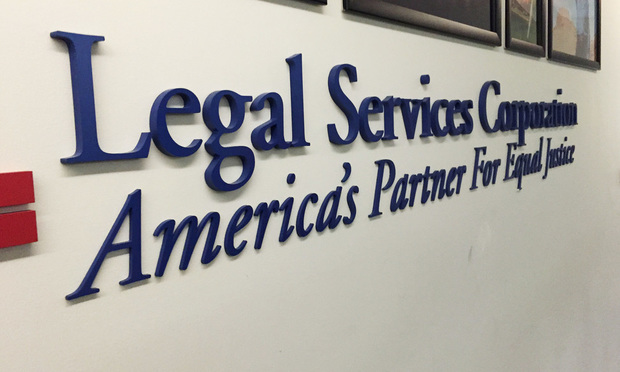Georgia Legal Services and Atlanta Legal Aid Awarded National Grants for Online Services
They were among 30 legal aid groups nationally to win federal Legal Services Corp. grants—many aimed at making it easier to gain legal help online.
October 14, 2019 at 04:23 PM
3 minute read
 (Photo: Diego M. Radzinschi/ALM)
(Photo: Diego M. Radzinschi/ALM)
The federal Legal Services Corp. has awarded sizable tech grants to the Georgia Legal Services Program and the Atlanta Legal Aid Society to expand the reach of their online, legal self-help services for low-income people with civil legal problems.
Georgia Legal Services will use a $218,000 technology initiative grant from the LSC to develop three interactive, online tutorials addressing common landlord-tenant issues. One will teach tenants representing themselves their rights and the steps for proceeding with a case, while the others will provide training for the group's pro bono lawyers and legal aid staff. The tutorials will require users to answer multiple-choice questions to ensure they understand the concepts.
Atlanta Legal Aid will use a $90,650 LSC technology initiative grant to improve the accessibility of AyudaLegalGeorgia.org, a Spanish-language, self-help legal services website. The group will also use funds to improve online intake for Spanish-speaking clients via its case management system.
"LSC's Technology Initiative Grants increase access to justice for low-income people with critical civil legal needs," said LSC president Jim Sandman in an announcement of the national TIG grants last week. "These technology projects improve the delivery of legal services and information to the millions of Americans who would otherwise have to navigate the legal system alone."
An LSC focus area for the annual tech grants has been improving self-help, legal aid websites that make it easier for those seeking legal assistance to find it online.
It awarded Atlanta Legal Aid and Georgia Legal Services a $134,720 grant in 2017 to upgrade their joint site, GeorgiaLegalAid.org, which provides self-help legal information. That included making it user-friendly for those with sight, hearing or other disabilities.
There is a huge shortage of legal aid available for low-income Americans who can't afford a lawyer, according to a 2017 LSC report, The Justice Gap, that measured unmet legal needs. Their top three legal problems stem from family issues, housing problems and problems with wages and benefits, according to the report.
In Georgia, about 22% of the state's 10 million population have family incomes that fall below 125% of the federal poverty level—and nationally more than 60 million Americans fall in this category.
But a lack of resources means that 86% of civil legal problems for people at this income level are not addressed, according to the report. The LSC estimated that low-income Americans would seek help for 1.7 million civil legal problems nationally from the legal aid programs it helps to fund—and that the majority (62% to 72%) would receive inadequate or no legal assistance because of the shortage of resources.
Georgia Legal Services and Atlanta Legal Aid, the state's two largest legal aid groups, were among 30 recipients nationally of the LSC's annual tech initiative awards, which totaled more than $4 million. The LSC provides funding to 132 nonprofit legal aid programs in every state, the District of Columbia and U.S. territories.
Established in 2000, LSC's technology initiative grant program supports legal aid organizations in developing technologies that increase access to effective legal assistance.
This content has been archived. It is available through our partners, LexisNexis® and Bloomberg Law.
To view this content, please continue to their sites.
Not a Lexis Subscriber?
Subscribe Now
Not a Bloomberg Law Subscriber?
Subscribe Now
NOT FOR REPRINT
© 2025 ALM Global, LLC, All Rights Reserved. Request academic re-use from www.copyright.com. All other uses, submit a request to [email protected]. For more information visit Asset & Logo Licensing.
You Might Like
View All

On The Move: Ex-Partner Returns to Lead Nelson Mullins Corporate Group, Burr & Forman Hires University GC as COO
5 minute read
Law Firm Sued for Telemarketing Calls to Customers on Do Not Call Registry

Trending Stories
- 1New York-Based Skadden Team Joins White & Case Group in Mexico City for Citigroup Demerger
- 2No Two Wildfires Alike: Lawyers Take Different Legal Strategies in California
- 3Poop-Themed Dog Toy OK as Parody, but Still Tarnished Jack Daniel’s Brand, Court Says
- 4Meet the New President of NY's Association of Trial Court Jurists
- 5Lawyers' Phones Are Ringing: What Should Employers Do If ICE Raids Their Business?
Who Got The Work
J. Brugh Lower of Gibbons has entered an appearance for industrial equipment supplier Devco Corporation in a pending trademark infringement lawsuit. The suit, accusing the defendant of selling knock-off Graco products, was filed Dec. 18 in New Jersey District Court by Rivkin Radler on behalf of Graco Inc. and Graco Minnesota. The case, assigned to U.S. District Judge Zahid N. Quraishi, is 3:24-cv-11294, Graco Inc. et al v. Devco Corporation.
Who Got The Work
Rebecca Maller-Stein and Kent A. Yalowitz of Arnold & Porter Kaye Scholer have entered their appearances for Hanaco Venture Capital and its executives, Lior Prosor and David Frankel, in a pending securities lawsuit. The action, filed on Dec. 24 in New York Southern District Court by Zell, Aron & Co. on behalf of Goldeneye Advisors, accuses the defendants of negligently and fraudulently managing the plaintiff's $1 million investment. The case, assigned to U.S. District Judge Vernon S. Broderick, is 1:24-cv-09918, Goldeneye Advisors, LLC v. Hanaco Venture Capital, Ltd. et al.
Who Got The Work
Attorneys from A&O Shearman has stepped in as defense counsel for Toronto-Dominion Bank and other defendants in a pending securities class action. The suit, filed Dec. 11 in New York Southern District Court by Bleichmar Fonti & Auld, accuses the defendants of concealing the bank's 'pervasive' deficiencies in regards to its compliance with the Bank Secrecy Act and the quality of its anti-money laundering controls. The case, assigned to U.S. District Judge Arun Subramanian, is 1:24-cv-09445, Gonzalez v. The Toronto-Dominion Bank et al.
Who Got The Work
Crown Castle International, a Pennsylvania company providing shared communications infrastructure, has turned to Luke D. Wolf of Gordon Rees Scully Mansukhani to fend off a pending breach-of-contract lawsuit. The court action, filed Nov. 25 in Michigan Eastern District Court by Hooper Hathaway PC on behalf of The Town Residences LLC, accuses Crown Castle of failing to transfer approximately $30,000 in utility payments from T-Mobile in breach of a roof-top lease and assignment agreement. The case, assigned to U.S. District Judge Susan K. Declercq, is 2:24-cv-13131, The Town Residences LLC v. T-Mobile US, Inc. et al.
Who Got The Work
Wilfred P. Coronato and Daniel M. Schwartz of McCarter & English have stepped in as defense counsel to Electrolux Home Products Inc. in a pending product liability lawsuit. The court action, filed Nov. 26 in New York Eastern District Court by Poulos Lopiccolo PC and Nagel Rice LLP on behalf of David Stern, alleges that the defendant's refrigerators’ drawers and shelving repeatedly break and fall apart within months after purchase. The case, assigned to U.S. District Judge Joan M. Azrack, is 2:24-cv-08204, Stern v. Electrolux Home Products, Inc.
Featured Firms
Law Offices of Gary Martin Hays & Associates, P.C.
(470) 294-1674
Law Offices of Mark E. Salomone
(857) 444-6468
Smith & Hassler
(713) 739-1250






